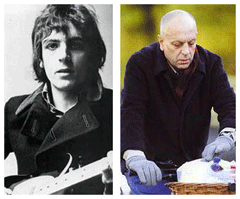
Syd Barrett has died at the age of 60. Barrett, the original mastermind of Pink Floyd, famously went off the rails early in the group's history and was sidelined as a serious musical force long before his band hit the big time. But he did make a couple of solo records. I discovered his music, fittingly, in a moment of madness.
It's the mid-70s in Brandon, Manitoba. While waiting for a summer paycheque I convince my parents to lend me a credit card so I can visit the Autumn Stone record store. It is my first experience with credit, a fact that the canny store-owner exploits. He eggs me on as I rush about giddily, piling records on the counter. "Grab this one," he says. "And this. And you have to get this one," he says, pointing to an amber-coloured album cover. "It's amazing."
The cover features a man crouching in an empty room, shaggy hair completely covering his eyes. It's The Madcap Laughs, Barrett's first solo record from 1970. In the grip of credit madness I throw it on the pile, plus his second album, Barrett, without the usual agonizing that typically characterizes my expenditures in those financially straitened student days. By the time the delirium breaks I've spent half my pending wages. (Chastened, I would not allow myself to possess a credit card for about 25 years.)
Different shade of Pink
Once home I'm not sure what I have. The Madcap Laughs is certainly an album unlike any other I've heard at that point -- an odd, hypnotic, sketchy, unpolished ramble that appears to represent the antithesis of post-Beatles recording sophistication. It sounds like it was recorded in great swaths, with Barrett finishing one song, turning a few pages and launching into the next, sometimes accompanied by backing musicians and sometimes only by his guitar. False starts, muttering and arguments with the booth are preserved.
Some of Barrett's songs on Madcap have an introspective, stream-of-consciousness feel, like an internal dialogue overheard. Others are just a lark, belying Barrett's image as a troubled wreck. It would be hard to imagine a record further in spirit and tone from the awesome, state-of-the-mid-1970s productions of his former band. The Madcap Laughs doesn't sound like 1970. Its simplicity has preserved it, a record that reflects only the oddly appealing musicality of Barrett himself.
'Crazy Diamond'
But Barrett's solo albums would not be the beginning of a parallel career that would offer a counterpoint to the Pink Floyd mega-beast. Damaged by drug use that may have exacerbated pre-existing psychological problems, Barrett dropped out of music entirely (although he reportedly showed up at the recording of the album Wish You Were Here, offering to "do his bit"). He would be saluted by his bandmates in the song "Shine On You Crazy Diamond," a legendary figure to fans of the group, but rarely investigated. Only Floyd's first album Piper at the Gates of Dawn and portions of Ummagumma reflect Barrett's direct involvement with the band he reportedly named after bluesmen Pink Anderson and Floyd Council. Pink Floyd was Barrett's group to begin with though, and their meteoric career followed a trajectory originally set by his offbeat style.
Barrett's name has usually surfaced only as a curiosity or a cautionary tale, until at last it reappeared Tuesday for the same reason that offers most forgotten figures a final headline. But Syd deserved better. Ironic that Johnny Lydon would begin his late-70s journey toward punk immortality by walking around London in a T-shirt reading "I hate Pink Floyd." Years before the opening salvo from the Sex Pistols, the former leader of Pink Floyd was already making records that presaged the unvarnished do-it-yourself ethos of punk. "I tattooed my brain," he sings in "Dark Globe." "Won't you miss me? Wouldn't you miss me at all?"
Steve Burgess manages to be The Tyee's culture critic at large with little or no expense account. ![]()















Tyee Commenting Guidelines
Comments that violate guidelines risk being deleted, and violations may result in a temporary or permanent user ban. Maintain the spirit of good conversation to stay in the discussion.
*Please note The Tyee is not a forum for spreading misinformation about COVID-19, denying its existence or minimizing its risk to public health.
Do:
Do not: